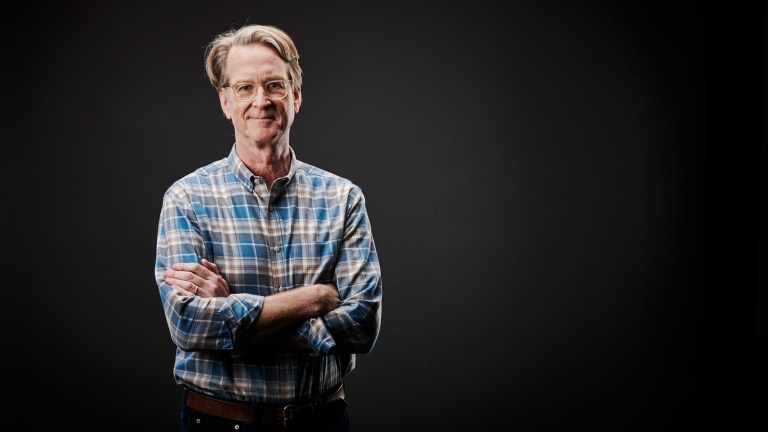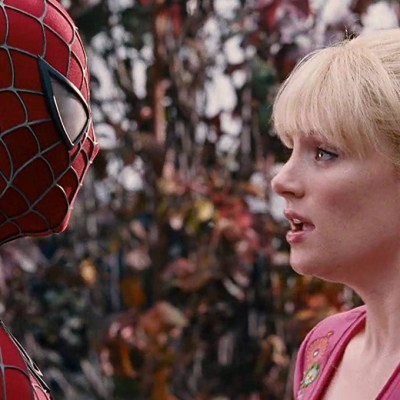How David Koepp’s New Horror Novella Yard Work Became a Terrifying Audiobook
Jurassic Park and Spider-Man writer David Koepp spins a new tale of human vs. nature in his audio book Yard Work.

After publishing his first novel, Cold Storage, last year, famed screenwriter David Koepp — whose work includes such movies as Jurassic Park, Spider-Man, Mission: Impossible and War of the Worlds — is unleashing a new novella titled Yard Work this week exclusively through Audible, the online audio book and podcast platform owned by Amazon.
In a recent phone interview, Koepp told us that completing Cold Storage gave him a desire to keep working in the prose format, saying, “I really enjoyed writing prose and it was a delight after almost 30 years of writing movies, which have their own sets of rules about what you can do, just in terms of the medium. It was great to be able to write in a different format and get inside a character’s head a little bit more. I really enjoyed that.”
Read by Koepp’s good friend and collaborator Kevin Bacon (the pair recently worked together on Koepp’s latest directorial effort, You Should Have Left), Yard Work touches in horrifying fashion on a subject that Koepp has returned to in many of his screenplays: human beings struggling against an implacable force of nature.
In the tale, an elderly retired judge decides to retreat to his lake house after the death of his wife of 50 years. But soon after he arrives, the judge notices a strange new vine aggressively growing on a tree that he and his wife always loved. As he tries to fight the vine off, it soon invades his house, his body and his bloodstream itself, threatening to end his life with its own insidious existence.
Koepp revealed that the idea for Yard Work first came to him last summer. “At this house we live at in Amagansett, we sort of abut this agricultural preserve,” he explained. “There are these invasive vines that really did grow on the East Coast after Hurricane Sandy seven or eight years ago. They were taking over trees in the preserve and over the course of a couple of years, they pulled a tree down.”
He continued, “They were creeping into our trees, so I thought, well, I’ll handle this myself. So I started cutting these vines at their bases and pulling them out of the tree. It quickly turned into a very consuming project. I couldn’t stop because I wanted the trees to not die, but also I just get obsessive about things sometimes. Plus the vines were really nasty, quite thorny, and were scratching the hell on me. My storytelling mind started going, what if they’re fighting back? And what if one of these times when I pull this out of a tree, there’s a mouth at the end of it?”
As with many of the films he’s written, Koepp found himself writing about a conflict that we seem to constantly find ourselves in: human vs. nature. “It just gets more and more timely in an unpleasant way, I’m afraid,” he said. “Our place in nature and our constant battle with nature, which we are certainly going to lose, is ever present. There’s also just blind terror because I know we’re not going to win. Isn’t that just horrible? We’re going to lose someday. Every single one of us. Coming to some sort of peace with that, I think, is important.”
Koepp explained that he couldn’t stop thinking about the idea, and finally found the opportunity to start writing it once the pandemic lockdown went into effect last spring. “I wanted to do some more prose and I just started writing that [story],” he said. “It was great because I knew I wanted the lead to be an old man, and movies have so many restrictions, not only about how you tell the story, but who can be in it if you want to get your tens of millions of dollars. But books and Audible Originals and stories like this have no such restrictions.”
By the time he was finished, Koepp knew that Yard Work was too long to be a traditional short story but not quite lengthy enough to be a novel, falling into that strange gray category known as the novella. But once he knew that, he also realized where he could place it. “I naturally thought of Audible Originals, which again, have this freedom of how you can tell your story,” he said. “And they’re meant to be a listening experience, which suggests a certain amount of performance. So I sent it to them. Happily, they liked it.”
So did Bacon, who Koepp approached personally to read the audiobook after the pair finished working together on You Should Have Left. “I just asked him to do it and it was a sort of a, hey, let’s put on a show thing,” said Koepp. “Everybody’s locked in quarantine. I wrote it in quarantine. He recorded it in his house in quarantine. We were able to do something creative while stuck in our homes.
“It was fun because he’s a fantastic actor and I thought his subtle differentiations between the characters was just beautifully done,” the writer added. “I hate when you listen to a story and someone goes all in on the accents and stuff and you’re like, no, no, no, just let the story be. I thought he just beautifully, subtly differentiated between the characters.”
Even though he’s written blockbuster movies like the first two Jurassic Park entries and War of the Worlds for Steven Spielberg, Tobey Maguire’s first outing as Spider-Man for Sam Raimi, and the initial Mission: Impossible feature for Brian De Palma — while also directing seven features on his own — Koepp admitted that he enjoyed writing both Cold Storage and Yard Work because they offered him the kind of complete creative freedom that is rare in filmmaking, even for a screenwriter with a track record like his.
“That’s the great thing about it,” he enthused. “Your only restrictions are your imagination. It can take place entirely in someone’s head or it can be the biggest action thing you can possibly imagine.”
Koepp says that another thing he enjoyed about writing a story for the audiobook format is that the platform is, in many ways, the successor to the radio plays that a massive swath of America used to listen to for decades, both before and after the advent of television. “I remember growing up in a small town in Wisconsin in the 1970s and I used to listen to CBS Radio Mystery Theater, which was reruns from the ’40s and ’50s,” he recalled. “And I loved it because if there wasn’t anything good on TV, I would go to the radio shows.
“The great thing about it is radio shows really are timeless,” continued Koepp. “When the internet came along and podcasts became a thing, it was really just going back to spoken word stuff and how great it is to listen to a story rather than have it shown to you. Stephen King said that if you tell someone there’s a monster behind the door, you better keep the door closed as long as possible because when you open it and you show a 10-foot monster, they’re going to say, ‘Oh, thank God, I thought it was a 100-foot monster.’ Their minds can always paint a much better, scarier picture than you can — I think that’s the beauty of spoken word storytelling.”
Yard Work is available from Audible Originals this Monday (August 31). Watch for more in the next few days from our interview with David Koepp as we discuss his work on Jurassic Park, Spider-Man, Carlito’s Way, and other classic films.

